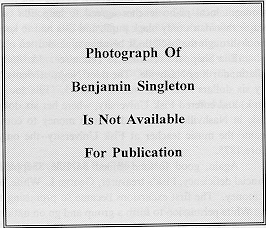 Benjamin "Pap"
Singleton called himself the "father of the Black Exodus," a
movement that began during the late 1860s and continued into the 1880s,
when thousands of freedmen resettled in Kansas, Oklahoma, Nebraska, Indiana,
and other areas. Singleton led nearly 8,000 blacks to Kansas via steamboat,
train, and wagon.
Benjamin "Pap"
Singleton called himself the "father of the Black Exodus," a
movement that began during the late 1860s and continued into the 1880s,
when thousands of freedmen resettled in Kansas, Oklahoma, Nebraska, Indiana,
and other areas. Singleton led nearly 8,000 blacks to Kansas via steamboat,
train, and wagon.
Singleton was a former Davidson County slave, born around 1809, and raised and trained as a cabinet maker. After being sold and sent to New Orleans, he escaped back to Nashville and then to Detroit and Canada. During the Civil War years, Singleton left Detroit and returned to Nashville, which was under Union army occupation. He made a living building cabinets and coffins, while he lived in a large Union camp for fugitive slaves along the riverbank in Edgefield (East Nashville, near the Jefferson Street bridge). When peddling his wares, "Pap" Singleton, as his fellow freedmen called him, preached to idle, destitute former-slaves about going west to farm and own federal homestead lands.
In September of 1869, black Nashvillians held a large meeting about migrating from the South Elias Polk, Robert Knowles, Randall Brown, Henry Carter, and Daniel Wadkins argued the pros and cons of leaving the South. Many of Nashville's freedmen were frustrated because of crowded and impoverished conditions, recent outbreaks of racial violence by whites, and the 1869 electoral defeat of their city Republican ticket by white Conservatives (Democrats). When the mass meeting failed to gain a vote for the exodus, Singleton and a Summer County black preacher, Columbus M. Johnson, organized a homestead association. Johnson was concerned about addressing the large federal contraband camps, which housed impoverished freedmen in Gallatin and Hendersonville. In 1872, the association sent a committee to investigate Kansas for settlement. A year later, Johnson, Singleton, and 300 persons boarded steamboats on the Cumberland River to settle in Cherokee County, Wyandotte, and Topeka, Kansas. For years, the north end of Topeka was called "Tennessee Town."
In April of 1875, Singleton, William A. Sizemore, and Benjamin Petway called for a state convention to discuss black migration to the West. The convention met in Liberty Hall (44 Cedar Street, now Charlotte), which was built in 1872 by and for Nashville's first black bank, the Freedman's Savings and Trust Company. The convention formed the Tennessee Emigration Society, sent delegates to Kansas, and resolved: "To the white people of Tennessee, and them alone, are due the ills borne by the colored people of this State." The Memphis Bulletin newspaper reported that the "chiefest ground of discontent is inadequate labor prices and delays in paying the same. A repair of this evil would tend greatly towards checking the flow of [black] immigration out of the State, already begun." Then the Nashville Colored People's Cooperative Emigration Club was formed "to improve the moral, intellectual, social, and material interests of the colored people." The leaders hoped to relieve crowding in Tennessee's urban black neighborhoods, resettle the black poor, and build a politically powerful society in the Far West.
Singleton, Sizemore, and their followers formed the Edgefield Real Estate Association, located at No. 5 Front Street. They held rallies in Brentwood and other black communities, raised funds by charging five cents for parties, and published newspapers to publicize the colored migration. Singleton criticized Frederick Douglass and other Republicans for opposing the freedmen's exodus from the South, saying, "Such men as this should not be leaders of our race any longer." But Douglass simply argued that the Negroes should remain in the South and fight the racist attempts to reenslave them. In Nashville, Singleton plastered lettered posters announcing: "Leave for Kansas on April 15, 1878." He established a colony at Dunlap, Morris County, Kansas, in June of 1879. At least 2,407 local blacks joined the exodus.
The Nashville Union and American called the Black Exodus "a foolish project," and white employers supported a campaign to attract Chinese laborers to replace the black workers. By 1882, the Black Exodus had stopped. The waters of the Cumberland River washed out all traces of the black emigrants who boarded so many steamboats near Edgefield. Benjamin "Pap" Singleton died out West during the late l880s and was buried in an unidentified grave.